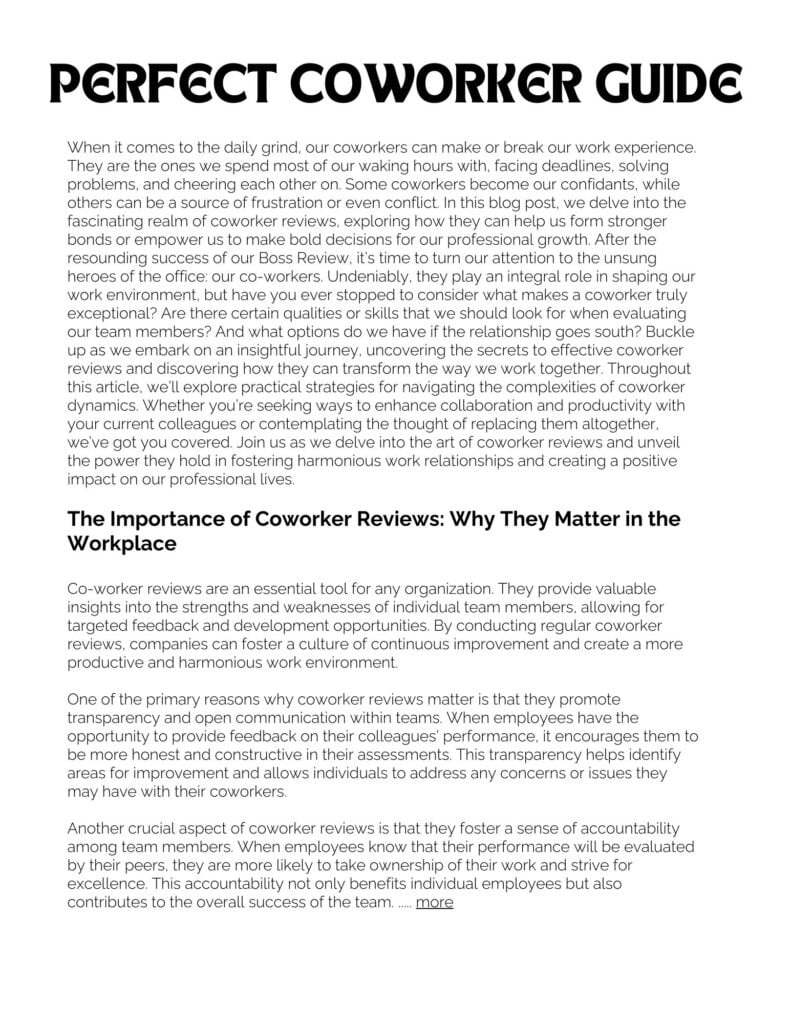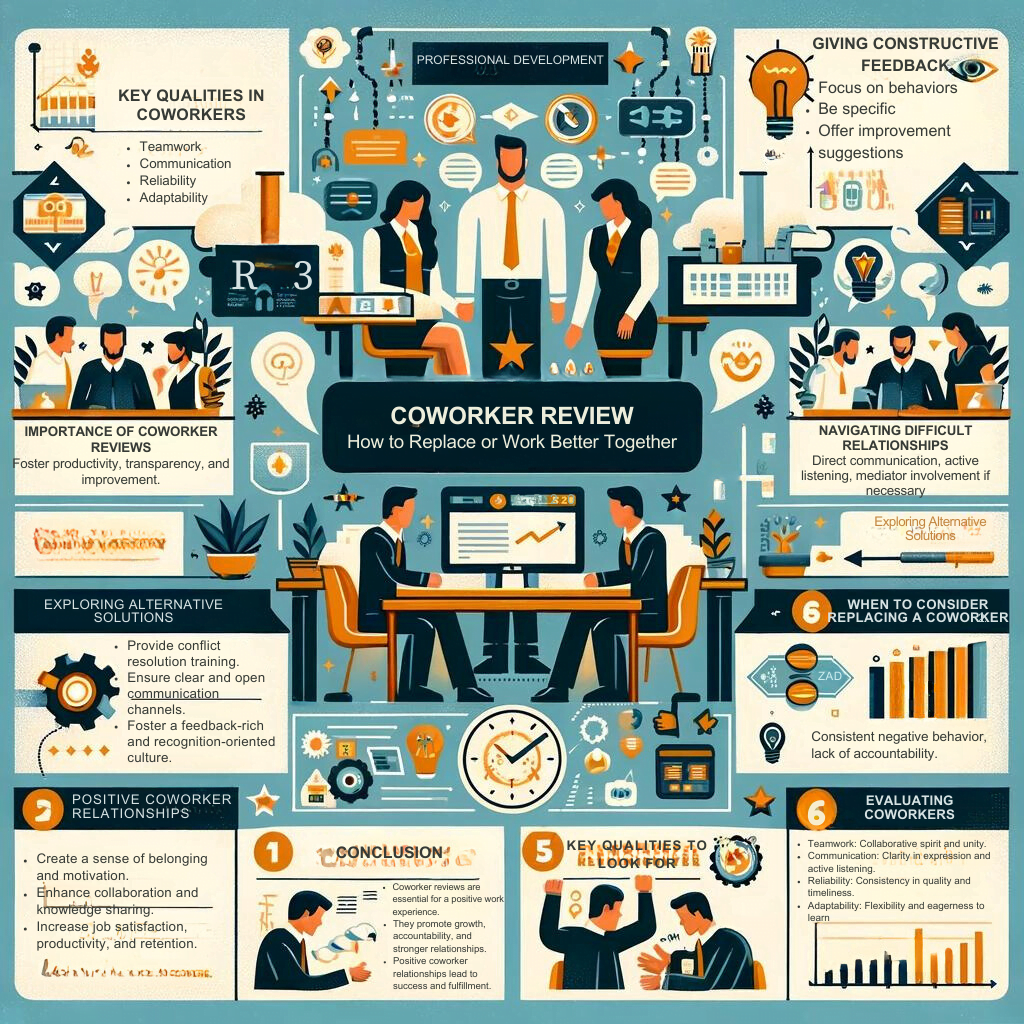Coworker Review: How to Replace or Work Better Together
When it comes to the daily grind, our coworkers can make or break our work experience. They are the ones we spend most of our waking hours with, facing deadlines, solving problems, and cheering each other on. Some coworkers become our confidants, while others can be a source of frustration or even conflict. In this blog post, we delve into the fascinating realm of coworker reviews, exploring how they can help us form stronger bonds or empower us to make bold decisions for our professional growth. After the resounding success of our Boss Review, it’s time to turn our attention to the unsung heroes of the office: our co-workers. Undeniably, they play an integral role in shaping our work environment, but have you ever stopped to consider what makes a coworker truly exceptional? Are there certain qualities or skills that we should look for when evaluating our team members? And what options do we have if the relationship goes south? Buckle up as we embark on an insightful journey, uncovering the secrets to effective coworker reviews and discovering how they can transform the way we work together. Throughout this article, we’ll explore practical strategies for navigating the complexities of coworker dynamics. Whether you’re seeking ways to enhance collaboration and productivity with your current colleagues or contemplating the thought of replacing them altogether, we’ve got you covered. Join us as we delve into the art of coworker reviews and unveil the power they hold in fostering harmonious work relationships and creating a positive impact on our professional lives.

The Importance of Coworker Reviews: Why They Matter in the Workplace
Co-worker reviews are an essential tool for any organization. They provide valuable insights into the strengths and weaknesses of individual team members, allowing for targeted feedback and development opportunities. By conducting regular coworker reviews, companies can foster a culture of continuous improvement and create a more productive and harmonious work environment.
One of the primary reasons why coworker reviews matter is that they promote transparency and open communication within teams. When employees have the opportunity to provide feedback on their colleagues’ performance, it encourages them to be more honest and constructive in their assessments. This transparency helps identify areas for improvement and allows individuals to address any concerns or issues they may have with their coworkers.
Furthermore, coworker reviews contribute to the overall growth and development of employees. By receiving feedback from their peers, individuals can gain valuable insights into their strengths and areas that need improvement. This feedback can then be used to create personalized development plans that focus on enhancing specific skills or competencies.
Another crucial aspect of coworker reviews is that they foster a sense of accountability among team members. When employees know that their performance will be evaluated by their peers, they are more likely to take ownership of their work and strive for excellence. This accountability not only benefits individual employees but also contributes to the overall success of the team.
Evaluating Coworkers: Key Qualities to Look For
When evaluating coworkers, it’s essential to consider certain key qualities that contribute to a positive work environment and effective collaboration. These qualities can vary depending on the nature of the job or industry; however, some common traits are universally desirable.
Firstly, teamwork is a crucial quality to look for in coworkers. Employees who excel at working collaboratively with others tend to contribute more effectively to team projects and foster a sense of unity within the group. They are willing to share knowledge, support their colleagues, and actively participate in achieving shared goals.
Secondly, strong communication skills are vital for effective coworker relationships. Coworkers who can express their thoughts and ideas clearly and listen actively to others’ perspectives contribute to better decision-making processes and minimize misunderstandings or conflicts.
Additionally, reliability is an essential quality in coworkers. Employees who consistently meet deadlines, fulfill their commitments, and deliver high-quality work can be relied upon by their team members. This reliability creates trust within the team and ensures that everyone can depend on each other to achieve common objectives.
Lastly, adaptability is a valuable quality in today’s fast-paced work environment. Coworkers who can quickly adjust to changing circumstances, embrace new technologies or methodologies, and demonstrate a willingness to learn and grow are highly valuable assets for any organization.
Giving Constructive Feedback: Enhancing Communication and Collaboration
Constructive feedback is a critical component of coworker reviews as it helps individuals identify areas for improvement and grow professionally. However, giving feedback can be challenging as it requires tactfulness and sensitivity to ensure that it is well-received by the recipient.
When providing constructive feedback to coworkers, it’s important to focus on specific behaviors or actions rather than making personal attacks. By framing feedback in a non-judgmental manner and highlighting the impact of certain behaviors on the team or project outcomes, individuals are more likely to accept the feedback positively.
Additionally, it’s crucial to offer suggestions for improvement when providing feedback. Instead of solely pointing out shortcomings or mistakes, provide guidance on how coworkers can enhance their skills or approaches. This approach demonstrates that you genuinely want your colleagues to succeed and are invested in their growth.
Furthermore, timing is key when giving feedback. Choose an appropriate moment when both parties are receptive and have the time and space to engage in a constructive conversation. Avoid giving feedback in public or high-pressure situations that may cause embarrassment or defensiveness.
Lastly, remember to be open to receiving feedback as well. Coworker reviews should be a two-way street, allowing for reciprocal feedback and learning opportunities. By demonstrating your willingness to listen and improve based on others’ input, you create a culture of continuous growth and development within your team.
Navigating Difficult Coworker Relationships: Strategies for Conflict Resolution
Difficult coworker relationships can significantly impact job satisfaction and productivity. However, there are strategies that can help navigate these challenging dynamics and foster healthier working relationships.
Firstly, it’s important to address any issues or conflicts directly with the coworker involved. Avoid gossiping or venting frustrations to other colleagues as this can escalate the situation further. Instead, approach the individual in a calm and respectful manner, expressing your concerns or observations without assigning blame.
Active listening is another crucial skill when navigating difficult coworker relationships. Take the time to understand the other person’s perspective and motivations behind their behavior. This empathy can help uncover underlying issues or misunderstandings that may be contributing to the conflict.
If direct communication does not resolve the issue, involving a mediator or seeking guidance from a supervisor or HR department may be necessary. These neutral parties can provide an objective perspective on the situation and offer potential solutions for resolution.
In some cases, it may be necessary to set boundaries with difficult coworkers if their behavior continues to negatively impact your work experience. This could involve limiting interactions with them or seeking alternative work arrangements if feasible.
Building Stronger Bonds: Strengthening Teamwork and Collaboration
Building stronger bonds with coworkers is essential for fostering teamwork and collaboration. When individuals feel connected and supported by their colleagues, they are more likely to go the extra mile, share knowledge, and contribute to a positive work environment.
One effective strategy for strengthening bonds is to create opportunities for team-building activities. These activities can range from informal social gatherings to structured team-building exercises. The goal is to encourage open communication, build trust, and foster a sense of camaraderie among team members.
Another way to strengthen teamwork is through regular check-ins or meetings where team members can discuss ongoing projects, share updates, and address any challenges or concerns. These meetings provide a platform for collaboration and ensure that everyone is aligned towards common goals.
Additionally, recognizing and celebrating individual and team achievements can also contribute to stronger bonds. Acknowledging the efforts and accomplishments of coworkers fosters a positive work culture where everyone feels valued and appreciated.
Empowering Personal Growth: Using Coworker Reviews to Drive Professional Development
Coworker reviews are not only beneficial for evaluating performance but also for driving personal growth and professional development. By leveraging coworker feedback effectively, individuals can identify areas where they can improve their skills or expand their knowledge.
One way to empower personal growth through coworker reviews is by creating development plans based on the feedback received. These plans should outline specific goals or objectives that individuals want to achieve within a certain timeframe. They should also include actionable steps or strategies for reaching these goals.
Mentorship programs can also be an effective tool for personal growth. Pairing employees with more experienced colleagues who can provide guidance, support, and advice can significantly enhance their professional development journey.
Furthermore, organizations can offer training programs or workshops based on the feedback received from coworker reviews. These programs can address common areas for improvement or provide opportunities for employees to acquire new skills that are relevant to their roles.
When to Consider Replacing a Coworker: Signs to Watch Out For
While coworker reviews are primarily aimed at improving relationships and fostering growth, there may be instances where replacing a coworker becomes necessary. It’s important to recognize the signs that indicate a toxic or unproductive working relationship.
Consistent negative behavior, such as constant criticism, belittling, or undermining others, is a red flag that warrants consideration for replacement. Toxic coworkers can create a hostile work environment and hinder team productivity.
Lack of accountability or refusal to take responsibility for one’s actions is another warning sign. Coworkers who consistently shift blame onto others or fail to meet their commitments can disrupt team dynamics and impede progress.
Additionally, if efforts to address conflicts or improve the relationship have been unsuccessful over an extended period, it may be time to consider replacing the coworker. Continuously working in a toxic or unproductive environment can take a toll on individual well-being and overall team morale.
Exploring Alternative Solutions: Strategies for Improving the Work Environment
In some cases, rather than replacing a coworker, exploring alternative solutions may be more appropriate. This involves identifying strategies that can improve the work environment and enhance collaboration among team members.
One potential solution is providing conflict resolution training or workshops for employees. These programs can equip individuals with the necessary skills and techniques for effectively managing conflicts and fostering healthier working relationships.
Creating clear communication channels within the organization is another strategy for improving the work environment. Ensuring that employees have access to open lines of communication with their coworkers and superiors promotes transparency and reduces misunderstandings.
Additionally, fostering a culture of feedback and recognition can contribute to a more positive work environment. Encouraging employees to provide regular feedback to their coworkers and recognizing their achievements can create a supportive atmosphere where everyone feels valued.
The Power of Positive Coworker Relationships: How They Impact Job Satisfaction and Productivity
Positive coworker relationships have a significant impact on job satisfaction and productivity. When individuals feel supported, respected, and connected to their colleagues, they are more likely to enjoy their work and perform at their best.
One way positive coworker relationships enhance job satisfaction is by creating a sense of belonging. When employees feel like they are part of a cohesive team that values their contributions, they are more motivated to give their best effort.
Furthermore, positive coworker relationships contribute to increased collaboration and knowledge sharing. When individuals trust and respect each other, they are more willing to collaborate on projects, share ideas, and seek input from others. This collaboration leads to better problem-solving outcomes and improved overall productivity.
In addition to job satisfaction and productivity benefits, positive coworker relationships also contribute to employee retention. Employees who have strong connections with their coworkers are less likely to seek opportunities elsewhere as they feel fulfilled in their current work environment.
Conclusion: Harnessing the Power of Coworker Reviews for a Better Work Experience
Coworker reviews play a crucial role in shaping our work experience. By evaluating our colleagues’ performance, we gain valuable insights into our own strengths and areas for improvement. These reviews promote transparency, accountability, personal growth, and collaboration within teams.
When evaluating coworkers, it’s important to consider key qualities such as teamwork, communication skills, reliability, and adaptability. Giving constructive feedback is essential for enhancing communication and collaboration, while strategies for conflict resolution can help navigate difficult coworker relationships.
Building stronger bonds with coworkers fosters teamwork and collaboration, while using coworker reviews to drive personal growth empowers individuals to reach their full potential. Knowing when to consider replacing a coworker and exploring alternative solutions are also crucial aspects of effective coworker reviews.
Ultimately, positive coworker relationships have a profound impact on job satisfaction and productivity. By harnessing the power of coworker reviews, we can create a better work experience for ourselves and our colleagues, leading to greater success and fulfillment in our professional lives.






